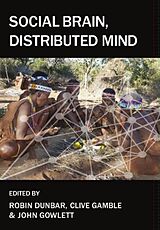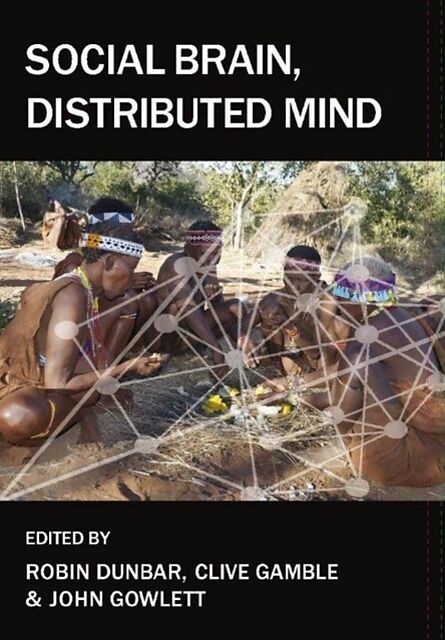Social Brain, Distributed Mind
Einband:
Fester Einband
EAN:
9780197264522
Untertitel:
Englisch
Genre:
Soziologie
Autor:
Robin Dunbar, Clive Gamble, John Gowlett
Herausgeber:
Oxford Academic
Anzahl Seiten:
548
Erscheinungsdatum:
29.04.2010
ISBN:
978-0-19-726452-2
Zusatztext There is much of value to this volume. Informationen zum Autor Robin Dunbar is Professor of Evolutionary Anthropology at the University of Oxford and a Fellow of the British Academy. Clive Gamble is Professor of Geography at the Royal Holloway, University of London and Fellow of the British Academy. John Gowlett is Professor of Archaeology at the University of Liverpool. Klappentext This volume explores how hominin 'brains' became recognisably human 'minds', comparing perspectives from the humanities, social, and biological sciences. New ideas associated with the social brain hypothesis and the concept of the distributed mind, allow us to envisage what might have happened in this crucial phase leading up to modern humans. Zusammenfassung To understand who we are and why we are, we need to understand both modern humans and the ancestral stages that brought us to this point. The core to that story has been the role of evolving cognition -the social brain - in mediating the changes in behaviour that we see in the archaeological record. This volume brings together two powerful approaches - the social brain hypothesis and the concept of the distributed mind. The volume compares perspectives on these two approaches from a range of disciplines, including archaeology, psychology, philosophy, sociology and the cognitive and evolutionary sciences. A particular focus is on the role that material culture plays as a scaffold for distributed cognition, and how almost three million years of artefact and tool uses provides the data for tracing key changes in areas such as language, technology, kinship, music, social networks and the politics of local, everyday interaction in small-world societies. A second focus is on how, during the course of hominin evolution, increasingly large spatially distributed communities created stresses that threatened social cohesion. This volume offers the possibility of new insights into the evolution of human cognition and social lives that will further our understanding of the relationship between mind and world. Inhaltsverzeichnis Framing the Issues: Evolution of the Social Brain 1: Robin Dunbar, Clive Gamble, and John Gowlett: The Social Brain and its Distributed Mind 2: Clive Gamble: Technologies of Separation and the Evolution of Social Extension 3: Yonas Beyene: Herto Brains and Minds: Behaviour of Early Homo Sapiens from the Middle Awash, Ethiopia The Nature of Network: Bonds of Sociality 4: Julia Lehmann, Katherine Andrews, and Robin Dunbar: Social Complexity and the Importance of Indirect Relationships: Social Networks in Primates 5: Robert Layton and Sean O'Hara: Fission-Fusion Behaviour in Chimpanzees and Hunter-Gatherers 6: Sam Roberts: Constraints on Social Networks 7: Anna Wallette: Social Networks and Community in the Viking Age Evolving Bonds of Sociality 8: Robin Dunbar: Deacon's Dilemma: the Problem of Pairbonding in Human Evolution 9: Julie Hui and Terrence Deacon: The Evolution of Altruism via Social Addiction 10: Dwight Read: From Experiential-Based to Relational-Based forms of Social Organization: a Major Transition in the Evolution of Homo Sapiens 11: Carl Knappett: Networks and the Evolution of Socio-Material Differentiation The Reach of the Brain: Modern Humans and Distributed Minds 12: Alan Barnard: When Individuals Do Not Stop at the Skin 13: Holly Arrow: Cliques, Coalitions, Comrades, and Colleagues: Sources of Cohesion in Groups 14: Richard Sosis: Evolutionary Signalling Theory and Religion: Recent Advances and Future Directions 15: Paul Connerton: Some Functions of Collective Forgetting 16: Mark Rowlands: Consciousness and Culture Testing the Past: Archaeology and the Social Brain in Past Action 17: John Gowlett: Firing up the Intellect 18: Lawrence Barham: Multi-Tasking and the Social Brain in Middle Pleistocene Africa 19: Ma...
There is much of value to this volume.
Autorentext
Robin Dunbar is Professor of Evolutionary Anthropology at the University of Oxford and a Fellow of the British Academy. Clive Gamble is Professor of Geography at the Royal Holloway, University of London and Fellow of the British Academy. John Gowlett is Professor of Archaeology at the University of Liverpool.
Klappentext
This volume explores how hominin 'brains' became recognisably human 'minds', comparing perspectives from the humanities, social, and biological sciences. New ideas associated with the social brain hypothesis and the concept of the distributed mind, allow us to envisage what might have happened in this crucial phase leading up to modern humans.
Zusammenfassung
To understand who we are and why we are, we need to understand both modern humans and the ancestral stages that brought us to this point. The core to that story has been the role of evolving cognition -the social brain - in mediating the changes in behaviour that we see in the archaeological record. This volume brings together two powerful approaches - the social brain hypothesis and the concept of the distributed mind. The volume compares perspectives on these two approaches from a range of disciplines, including archaeology, psychology, philosophy, sociology and the cognitive and evolutionary sciences. A particular focus is on the role that material culture plays as a scaffold for distributed cognition, and how almost three million years of artefact and tool uses provides the data for tracing key changes in areas such as language, technology, kinship, music, social networks and the politics of local, everyday interaction in small-world societies. A second focus is on how, during the course of hominin evolution, increasingly large spatially distributed communities created stresses that threatened social cohesion. This volume offers the possibility of new insights into the evolution of human cognition and social lives that will further our understanding of the relationship between mind and world.
Inhalt
Framing the Issues: Evolution of the Social Brain
1: Robin Dunbar, Clive Gamble, and John Gowlett: The Social Brain and its Distributed Mind
2: Clive Gamble: Technologies of Separation and the Evolution of Social Extension
3: Yonas Beyene: Herto Brains and Minds: Behaviour of Early Homo Sapiens from the Middle Awash, Ethiopia
The Nature of Network: Bonds of Sociality
4: Julia Lehmann, Katherine Andrews, and Robin Dunbar: Social Complexity and the Importance of Indirect Relationships: Social Networks in Primates
5: Robert Layton and Sean O'Hara: Fission-Fusion Behaviour in Chimpanzees and Hunter-Gatherers
6: Sam Roberts: Constraints on Social Networks
7: Anna Wallette: Social Networks and Community in the Viking Age
Evolving Bonds of Sociality
8: Robin Dunbar: Deacon's Dilemma: the Problem of Pairbonding in Human Evolution
9: Julie Hui and Terrence Deacon: The Evolution of Altruism via Social Addiction
10: Dwight Read: From Experiential-Based to Relational-Based forms of Social Organization: a Major Transition in the Evolution of Homo Sapiens
11: Carl Knappett: Networks and the Evolution of Socio-Material Differentiation
The Reach of the Brain: Modern Humans and Distributed Minds
12: Alan Barnard: When Individuals Do Not Stop at the Skin
13: Holly Arrow: Cliques, Coalitions, Comrades, and Colleagues: Sources of Cohesion in Groups
14: Richard Sosis: Evolutionary Signalling Theory and Religion: Recent Advances and Future Directions
15: Paul Connerton: Some Functions of Collective Forgetting
16: Mark Rowlands: Consciousness and Culture
Testing the …

Leider konnten wir für diesen Artikel keine Preise ermitteln ...
billigbuch.ch sucht jetzt für Sie die besten Angebote ...
Die aktuellen Verkaufspreise von 6 Onlineshops werden in Realtime abgefragt.
Sie können das gewünschte Produkt anschliessend direkt beim Anbieter Ihrer Wahl bestellen.
Loading...
Die aktuellen Verkaufspreise von 6 Onlineshops werden in Realtime abgefragt.
Sie können das gewünschte Produkt anschliessend direkt beim Anbieter Ihrer Wahl bestellen.
| # | Onlineshop | Preis CHF | Versand CHF | Total CHF | ||
|---|---|---|---|---|---|---|
| 1 | Seller | 0.00 | 0.00 | 0.00 |
